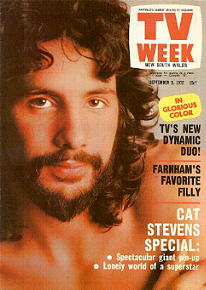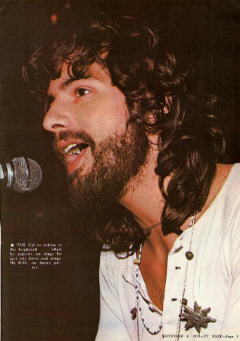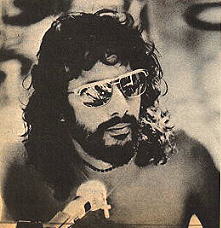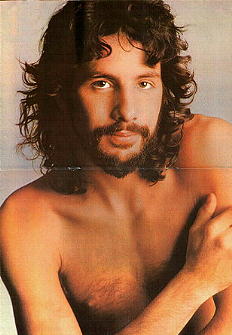This wonderful article from the Australian TV
Weekly equipped with the wonderful color cover and pin up, comes courtesy of Bruce
Lawrie.
The Lonely World of
Cat Stevens

Australian TV Week
9 September 1972
by Stephanie Thompson
When Cat Stevens appears on
stage, he sits down with his guitar and he sings. Just that. There's no flip patter, no
joking remarks, no light chat. One might be forgiven for thinking that  the
whole thing is an astute theatrical ploy thought up by clever publicity men. For there's
no doubt that it adds a dramatic intensity to the on-stage performance of one of the
leading singing composers of the ballad world. It is, however, a completely genuine
reticence. As such it provides a clue to the essential core of the personality of Cat
Stevens, a self-confessed introvert and that rare thing in the pop world, a reluctant
superstar. the
whole thing is an astute theatrical ploy thought up by clever publicity men. For there's
no doubt that it adds a dramatic intensity to the on-stage performance of one of the
leading singing composers of the ballad world. It is, however, a completely genuine
reticence. As such it provides a clue to the essential core of the personality of Cat
Stevens, a self-confessed introvert and that rare thing in the pop world, a reluctant
superstar.
Stevens, who arrived in
Australia on August 20, was given his name by a former girlfriend because of the way he
screws up his sleepy dark eyes. But the name is more apt than just that. For, like a cat,
he is a loner: a man who, after five years in the public eye, has never been at ease with
the glare of the spotlight. He shuns publicity; lives alone in a half-decorated house in
Fulham, London; mixes with a small circle of close friends and is most relaxed with his
own family.
He was born Stephen
Georgiou, the son of a Greek restaurant owner and a Swedish mother, in central London. The
restaurant loomed large in his life. It kept his parents together (they are separated, but
work together at the cafe) and it was there during the washing up that he thought up the
songs that made him famous. "Washing up is the most boring job in the world, so I
thought up songs as I stacked the dishes. Then I'd rush up to my room and write them
down," explained Cat. It was over the washing up that he thought up his first hit song, I Love My Dog, and then his second, Matthew And Son.
hit song, I Love My Dog, and then his second, Matthew And Son.
At 18, he became an
overnight success, swept along by the wave of pop-mania that had begun with the Beatles
and soon encompassed so many British pop writers and singers. Cat's earnings jumped from 2
pounds a night to 300 pounds a night. Cautiously he put his money aside. "I have seen
too many kings for a day and paupers for years in show business," he said, with
admirable sense. But it was not just sense. It was also his introvert nature showing
through. He liked neither flashy cars nor luxury homes nor noisy nightclubs.
Cat Stevens soon found that
he didn't like personal appearances, either. The strain of appearing on stage five nights
a week soon began to show. To calm his nerves he smoked heavily and drank brandy before a
show - often a bottle a night. The inevitable happened. He collapsed. And when he went to
hospital the doctors found that he had tuberculosis and a collapsed lung. He spent three
months in hospital, another year recuperating. His career was in ruins along with his
health. At 20, Cat Stevens was written off as a has-been. No one, however, reckoned on his
hidden strength and on his complete and utter dedication to music. Cat emerged from his
illness a stronger and more dynamic character. He had finally made peace with himself -
and with the world. "I nearly went mad," he says of the time before he
collapsed. "I was in mental pain for a long time and my mind was losing the ability
to cope with certain incidents. "After a while, when a couple of records didn't
happen, I began to blame it on all sorts of things - the production, the public's bad
taste." While he was recuperating, Cat began writing songs again. Away from the
pressure of conforming to his own pop image, he was able to define more clearly his own
style of music.
 His
first album after his illness, Mona Bone Jakon, released in 1970, made it absolutely
certain that Cat Stevens was again a name to look out for. Songs like the beautifully
hesitant Morning Has Broken, and the subtleties of Wild World and Moonshadow soon
confirmed it. The songs that Stevens has written on three more famous LPs in the two years
since his illness have won him an even larger and more fanatical following than anything
he ever did before. He has lost his teeny bopper image, revealing a new depth on an all
together different level. His
first album after his illness, Mona Bone Jakon, released in 1970, made it absolutely
certain that Cat Stevens was again a name to look out for. Songs like the beautifully
hesitant Morning Has Broken, and the subtleties of Wild World and Moonshadow soon
confirmed it. The songs that Stevens has written on three more famous LPs in the two years
since his illness have won him an even larger and more fanatical following than anything
he ever did before. He has lost his teeny bopper image, revealing a new depth on an all
together different level.
There can be few song
writers whose new work is so genuinely awaited by an eager army of pop pundits. To them,
he sums up all the finer things of pop and all the true brilliance of contemporary ballad
writing. He admits that: "I eat, sleep and drink my music. It really takes up all my
thinking time." He could, he says, go without girls for a year for his music and
indeed he shuns the approaches of the teenage groupies who are part and parcel of the pop
world. He says he has been in love twice in his life, the most recent with Pattie
D'Arbanville, who inspired his hit single Lady D'Arbanville. But he is frankly wary of
falling in love again. "I've been in love twice and when we split up it tore me to
pieces," he said. For the moment at least, Cat Stevens will continue to be a loner. |